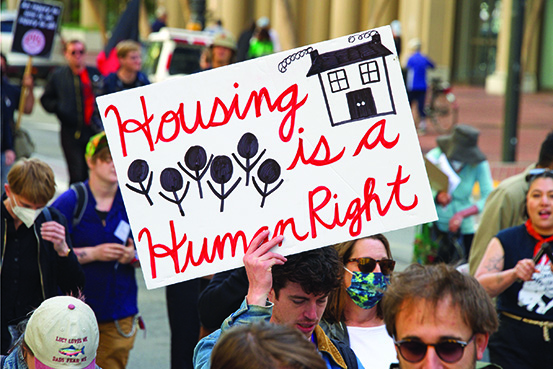Declaring a ‘Right’ to Housing Won’t Solve Homelessness

Instead, try making it easier to build more housing!
Several California Assembly members this year introduced a constitutional amendment that declares housing a “fundamental right.” Who knew? Lawmakers have wrestled with innumerable complex issues over the years, but finally someone realized that all they needed to do to magically solve any problem is to pass a new “right” to something.
Expected soon: constitutional amendments declaring “rights” to a million dollars, to a brand-new electric SUV, and to a dog that’s properly housebroken. Sorry for the facetiousness, but Assembly Constitutional Amendment 10 epitomizes the lack of seriousness we’ve come to expect from the Legislature. Actually fixing the housing problem is a tough slog.
The legislation, which would need approval by California voters, is modeled on United Nations measures from 1948 and 1966 declaring similar rights. The world’s housing stock has dramatically improved since then, but anyone who thinks that two toothless UN measures were the cause—rather than a booming market economy—really should claim the right to a therapist.
This proposed amendment is remarkably demanding. The Assembly analysis explains that the measure isn’t a right to “shelter,” which it finds inadequate. “The right to adequate housing should not be interpreted narrowly,” it notes. “Rather, it should be seen as the right to live somewhere in security, peace, and dignity.” Yet a state that can’t provide basic shelter for 180,000 homeless people shouldn’t be promising inchoate benefits such as dignity.
The legislation also defines the right to housing as “a right to protection from forced evictions, equal and nondiscriminatory access to housing, and that housing must be adequate.” That means housing “with security of tenure; availability of services, materials, facilities, and infrastructure” along with a location that offers “cultural adequacy.” Huh?
I have no idea what it means to have housing with “cultural adequacy,” but I do know what it means to have “protection from forced evictions” and “security of tenure.” That seems to mean that landlords would no longer be able to evict tenants for almost any reason, perhaps even including nonpayment of rent. That creates a practical (not to mention a constitutional) problem.
If a property owner can’t properly vet tenants and potentially can’t evict them, then they aren’t going to invest in or rent out apartments. They certainly aren’t going to make repairs to houses lived in by non-paying tenants, which will make the housing stock less adequate. We need more housing, not less, and such edicts discourage housing investment.
For precedent, ACA 10’s supporters point to the state’s “Human Right to Water” law declaring “that every human being has a right to safe, clean, affordable and accessible water adequate for human consumption, cooking, and sanitary purposes.” Signed by then-Gov. Jerry Brown in 2012, it sounded noble. Who doesn’t want everyone to have potable water?
But in the ensuing years, the state failed to provide clean drinking water to poor, farm-worker towns in the south San Joaquin Valley, even though the fix (hooking up those communities to infrastructure in neighboring water districts) was a tiny expense relative to the state budget. Apparently, the state is willing to grant human rights as it sees fit—but only if they’re cheap and easy. Following that law’s passage, the state continued to neglect its duty to build more water infrastructure.
So spare us these meaningless “rights” bills, which seem designed to result in press conferences rather than meaningful solutions. In fairness, some of ACA 10’s goals are reasonable—e.g., pushing localities to approve more housing construction. But this law wouldn’t accomplish that.
The state already is taking a serious approach toward deregulating land use through laws such as Senate Bills 9 and 10, which create a “by right” approval process for duplexes and mid-rise condos. The state also is battling NIMBY (Not In My Back Yard) cities such as Huntington Beach, which are fighting the laws’ implementation in the court system.
Those laws—and ones that reduce parking minimums and allow developers to build housing on commercial sites—were the result of hard work that involved tough negotiations, coalition building, and the usual legislative sausage-making. This “housing right” amendment is an affront to those efforts by pretending that there’s a shortcut.
There’s also much wrong philosophically with creating new “rights” via legislation and voter initiative. Historically, there are two types of rights—”negative” ones and “positive” ones. The former protects individuals from government usurpations. The First Amendment’s speech protections (“Congress shall make no law …”) is the premiere negative-right example.
By contrast, your positive right to housing means the government must force others to give it to you by taking their money (via taxation) or undermining their property rights (by limiting their right to evict you). Not only is that approach ethically wrong, but it will only lead to fewer available rentals. Then again, there’s nothing we can do to rein in lawmakers’ right to introduce worthless legislation.



